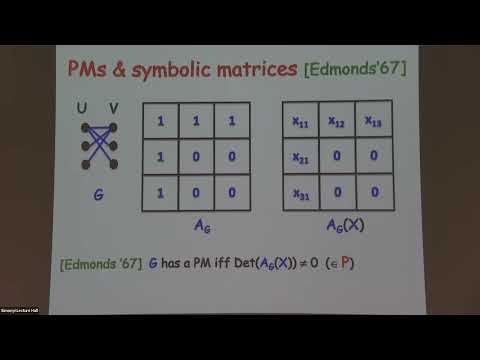Optimization, Complexity and Math (or, can we prove P!=NP by gradient descent?)
Presenter
September 19, 2023
Abstract
This talk will summarize a project I was involved in during the past 8 years. It started with attempts to understand the PIT (Polynomial Identity Testing) problem - a central problem involving randomness and hardness. It has led us to pursue many other goals. I hope to explain our most complete understanding we have so far, as well as challenges and open problems. The main messages of this project are summarized below; I plan to describe, through examples, many of the concepts they refer to, and the evolution of ideas leading to them. No special background is assumed.
The most basic tools of convex optimization in Euclidean space extend to a far more general setting of Riemannian manifolds that arise from the symmetries of noncommutative groups. We develop first-order and second-order algorithms, and analyze their performance in general. While proving convergence bounds requires heavy algebraic and analytic tools, convergence itself depends in an elegant way on natural ``smoothness’’ parameters, in analogy with the Euclidean (commutative) case.
These algorithms give exponential (or better) improvements in run-time for solving algorithmic many problems across CS, Math and Physics. In particular, these include problems in algebra (e.g. testing rational identities in non-commutative variables), in analysis (testing the feasibility and tightness of Brascamp-Lieb inequalities), in quantum information theory (to the quantum marginals problem), in algebraic geometry (to computing Kronecker coefficients), in computational complexity (to derandomizing new special cases of the PIT problem) and in optimization (to testing membership in large, implicitly described polytopes).
The focus on symmetries exposes old and reveals new relations between the problems above. Essentially, they are all membership problems in null cones and moment polytopes of natural group actions on natural spaces. Invariant theory, which studies such group actions, plays an essential role in this development. In particular, a beautiful non-commutative duality theory (expending linear programming duality in the commutative case), and notions of geodesic convexity (extending the Euclidean one) and moment maps (extending the Euclidean gradient) are central to the algorithms and their analysis. Interestingly, most algorithms in invariant theory are symbolic/algebraic, and these new numeric/analytic algorithms proposed here often significntly improve on them.
Based on joint works with Zeyuan Allen-Zhu, Peter Bürgisser, Cole Franks, Ankit Garg, Leonid Gurvits, Pavel Hrubes, Yuanzhi Li, Visu Makam, Rafael Oliveira and Michael Walter.
